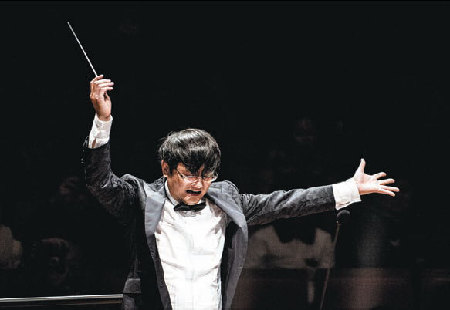
Classical music gets a hip facelift as composer Li Haiying creates a contemporary blend for an appreciative crowd. Provided to China Daily
Notes slide off the harp like a rippling river. Long tunes on the flute take the listeners into a quiet night. The images of a crescent moon, a curvy bridge and a small boat swaying gently on the river become vivid when melodies swing over the strings.
The Crescent Moon is a song known to every Chinese, with the soft melody soothing their nostalgia. The Mandopop classic was given a new life on its 24th birthday at the composer Li Haiying's concert in Guangzhou's Xinghai Concert Hall recently, with an orchestra replacing the singer's crooning.
Li, a forerunner of Chinese pop music's surge in the 1980s and 1990s, is the composer behind Mandopop classics including The Crescent Moon and I Don't Want to Say.
He came to Beijing in 1999, rising to the challenge of composing for movies and TV dramas in the next decade. His scores for the popular series Drawing Sword and Happiness as Flowers are still famous.
At the age of 58,the composer decided to pursue his childhood dreams about symphony and adapted his pop classics as orchestral music last year.
"With songwriting software and the Internet, now everybody can write a pop song and find audiences. I need to explore new areas in music where I'm the first mover," Li says, branding his pop symphony creation Eagles Symphony after his name, which literally means sea eagle.
Li says too many people fear they can not understand classical music with out a musical education background.
"My symphonies won't have a stiff face. I hope that people coming to my concert will feel at ease, share my joy in writing the music and be touched."
To enrich the concert this year, Li invited violinist Wen Wei, soprano Li Siyin and harmonica performer Yang Le to stage beautiful harmonies with the orchestra.
As the concert's conductor, Li showed a more relaxed and approachable style this time. Wearing a leather jacket instead of suit and bowtie, Li faced the audience, shared stories behind his music and explained what he wanted to present in each chapter before he started one.
Chen Qing, head of Guangzhou Symphony Orchestra, hopes that Li can help promote symphonic music among Chinese.
"The repertoire for a symphonic concert in China is still dominated by Western works because only a few Chinese orchestral pieces have been well-received by the public," Chen says.
"People are unable to enjoy the music if they find the melody strange and difficult to understand. So it's easy for people to remember Li's symphonic music because its melodies, based on his pop classics, are familiar to the audiences, like those popular orchestral works such as The Butterfly Lovers Violin Concerto and The Yellow River Piano Concerto."
Pop symphony is well developed in the US. For example, the Boston Pops Orchestra, founded early in 1885 as a popular exponent of the Boston Symphony Orchestra, has successfully drawn the public to orchestral music. John Williams, one of the greatest film composers of all time, has displayed the charm of orchestral music in his scorings for films such as Star Wars, Jurassic Park and Schindler's List.
"I hope that through long-term collaboration, Li and Guangzhou Symphony Orchestra will polish the brand of the Eagles Symphony and thus encourage more Chinese composers, especially young ones, to supply the country's want for pop symphony," Chen says.
Li played an important role in Guangdong's rise as the center of pop music in China in the 1990s. He composed many original Chinese pop hits, with which singers including Yang Yuying, Mao Ning and Han Lei rode to nationwide fame.
The golden time for Guangdong's music industry ended at the end of the decade, when many recording companies went bankrupt because copyrights were not well protected. Many musicians moved to Beijing, where original music was on the rise.
Li was one of them: For the past 14 years, he has mainly worked in Beijing, the capital of classical music in China. More than 10 orchestras thrive in the market and a lot of professionals are returning from overseas.
However, when he decided to make an attempt at pop symphony, Li chose to return to Guangzhou to work with the local orchestra.
"I hope pop symphony can make a good start in Guangdong and boom across the country, like how Chinese pop songs grew in Guangdong."
"Joy is what keeps me doing music, not a thirst for fame with my compositions. I think I will be learning something new about music when I'm 70 years old, which is fun."
We recommend:
